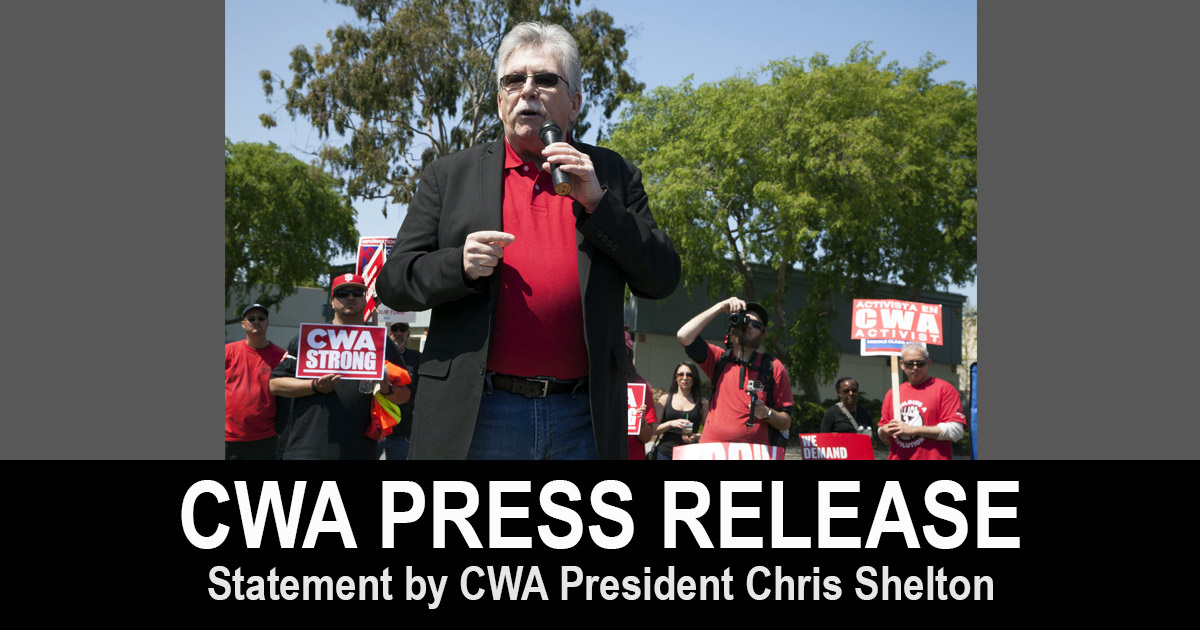CWA Union statement about FTC:

 cwa-union.org
cwa-union.org
By moving to file a lawsuit in administrative court to block Microsoft’s acquisition of Activision Blizzard, the Federal Trade Commission has missed an opportunity to demonstrate that it takes the labor impact of mergers seriously. Instead, the FTC has once again focused its analysis solely on consumer harms and, in this case, console-market leader Sony’s concerns about increased competition.
CWA has for years raised concerns about the effect of mergers on workers and the labor market and we have worked with economists to assess the real risk of monopsony to workers, including in this transaction. Union representation and collective bargaining agreements are the most powerful tools we have to balance power between workers and companies. Collective bargaining is a bulwark against downward pressure on wages from merged employers with increased market power. Contractual protections mean that union workers are more empowered to blow the whistle on dangerous or unethical behavior, which benefits both employees and consumers.
Activision Blizzard is using its already-significant power to resist workers' organizing efforts and clearly does not wish to respect its workers' right to freely and fairly organize a union. That's why CWA sought a remedy that would rein in these tech giants' labor market power – a labor neutrality agreement that enables workers to counteract the increased monopsony inherent in the merger through collective bargaining. After CWA brought our concerns to light, Microsoft agreed to enter into negotiations to show regulators their good faith efforts to address monopsony harms, resulting in a legally binding agreement with CWA.
Workers across the country, including in the video game industry, understand that one of the most effective ways to fight consolidated corporate power is to consolidate their own power by joining together in unions. The status quo for American corporations – particularly the tech sector – is to aggressively resist these efforts, including illegally firing workers and interfering with union elections.
Approving this merger with the labor agreement that we fashioned with Microsoft to protect collective bargaining rights would have sent a game-changing message to corporate America that workers do indeed have a seat at the table and their concerns matter and must be addressed. We believe the FTC’s case is not likely to convince a federal judge, particularly as the European Commission may move to approve the deal, and that workers at Activision Blizzard will finally have the opportunity to improve their wages, benefits and working conditions through their union.
About CWA: The Communications Workers of America represents working people in telecommunications, customer service, media, airlines, health care, public service and education, manufacturing, tech, and other fields.

CWA Statement on the FTC’s Decision to Sue to Block the Microsoft/Activision Deal
By moving to file a lawsuit in administrative court to block Microsoft’s acquisition of Activision Blizzard, the Federal Trade Commission has missed an opportunity to demonstrate that it takes the labor impact of mergers seriously.
By moving to file a lawsuit in administrative court to block Microsoft’s acquisition of Activision Blizzard, the Federal Trade Commission has missed an opportunity to demonstrate that it takes the labor impact of mergers seriously. Instead, the FTC has once again focused its analysis solely on consumer harms and, in this case, console-market leader Sony’s concerns about increased competition.
CWA has for years raised concerns about the effect of mergers on workers and the labor market and we have worked with economists to assess the real risk of monopsony to workers, including in this transaction. Union representation and collective bargaining agreements are the most powerful tools we have to balance power between workers and companies. Collective bargaining is a bulwark against downward pressure on wages from merged employers with increased market power. Contractual protections mean that union workers are more empowered to blow the whistle on dangerous or unethical behavior, which benefits both employees and consumers.
Activision Blizzard is using its already-significant power to resist workers' organizing efforts and clearly does not wish to respect its workers' right to freely and fairly organize a union. That's why CWA sought a remedy that would rein in these tech giants' labor market power – a labor neutrality agreement that enables workers to counteract the increased monopsony inherent in the merger through collective bargaining. After CWA brought our concerns to light, Microsoft agreed to enter into negotiations to show regulators their good faith efforts to address monopsony harms, resulting in a legally binding agreement with CWA.
Workers across the country, including in the video game industry, understand that one of the most effective ways to fight consolidated corporate power is to consolidate their own power by joining together in unions. The status quo for American corporations – particularly the tech sector – is to aggressively resist these efforts, including illegally firing workers and interfering with union elections.
Approving this merger with the labor agreement that we fashioned with Microsoft to protect collective bargaining rights would have sent a game-changing message to corporate America that workers do indeed have a seat at the table and their concerns matter and must be addressed. We believe the FTC’s case is not likely to convince a federal judge, particularly as the European Commission may move to approve the deal, and that workers at Activision Blizzard will finally have the opportunity to improve their wages, benefits and working conditions through their union.
About CWA: The Communications Workers of America represents working people in telecommunications, customer service, media, airlines, health care, public service and education, manufacturing, tech, and other fields.

